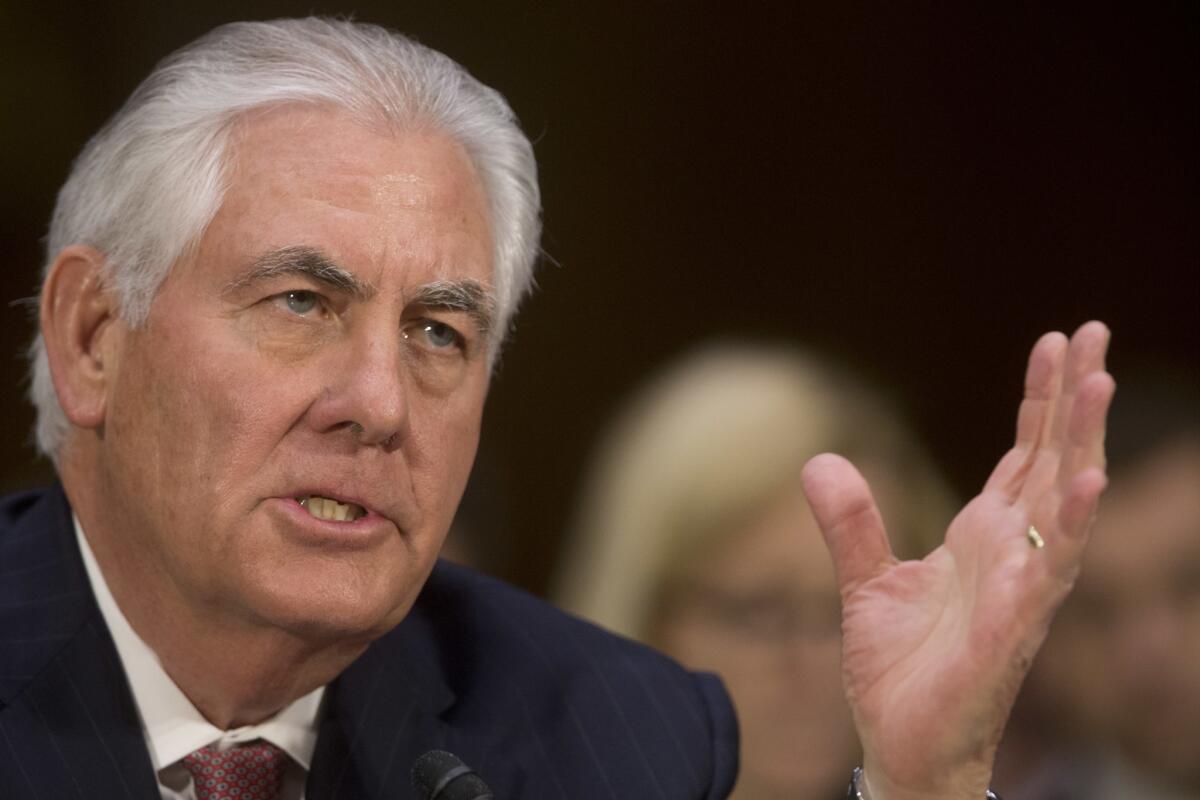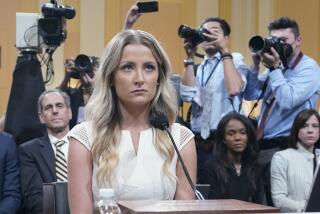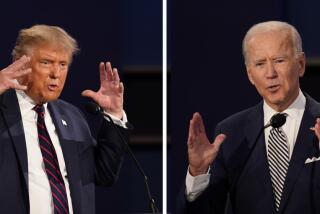Analysis: Trump’s Cabinet picks aren’t standing by some of his controversial opinions — or even discussing them

With the Senate having held confirmation hearings for seven of the incoming administration’s choices for top positions, a clear pattern has begun to emerge — prospective Cabinet members have carefully walked away from some of President-elect Donald Trump’s more controversial promises.
In the process, the public has begun to get a sense of which campaign pledges are likely to be put into action and which are likely to be pushed aside.
Waterboarding of terrorism suspects, registries for Muslim Americans, religious-based immigration bans and a more trusting relationship with Russia all drew strongly worded objections from Trump’s designees.
Trump’s views on global warming and the potential usefulness of building a wall along the Mexican border also drew skepticism.
By contrast, the Cabinet choices appear to share the president-elect’s often-expressed chilliness toward China, his support for greater military spending and his desire to see less federal scrutiny of how state and local police do their work.
Trump’s aides say the gaps between his positions and those of his Cabinet picks should not be a problem. Asked Thursday about the issue, Trump spokesman Sean Spicer said that in cases of disagreements, the president-elect’s agenda would prevail.
Cabinet selections needn’t be “100% pure” and were chosen for their expertise so that they could help shape Trump’s views, Spicer told reporters on a conference call, adding that “he’s not asking for clones.”
But despite public insistence that Trump would still be, as President George W. Bush used to say, “the decider” in his administration, another theme emerged this week: The sometimes startling degree to which the president-elect and his choices for the senior-most positions in his administration have not discussed key issues.
Some involve policies they will need to start acting on in just over a week.
After posing a series of questions Wednesday about Russia to Rex Tillerson, Trump’s choice for secretary of State, Sen. Robert Menendez (D-N.J.) asked, “For all of these answers that you’ve given me, does the president-elect agree with you?”
“The president-elect and I have not had the opportunity to discuss this specific issue or the specific area,” Tillerson replied.
He and Trump had talked about “a broad construct and in terms of the principles that are going to guide” foreign policy, Tillerson said, but a conversation about dealing with Russia “has not occurred yet, Senator.”
“That’s pretty amazing,” Menendez said.
The impression of a president-elect who is detached from the details — or in some cases even the broad outlines — of policy could change next week when Trump’s choices for key economic policy posts are scheduled to have their confirmation hearings.
In his public statements, including his frequent messages on Twitter as well as his news conference Wednesday, Trump has appeared most engaged in policies that involve jobs.
For now, however, the confirmation hearings have contributed to the overall uncertainty about how much Trump grasps, or intends to shape, the policies of the administration he will soon head.
That’s an image Democrats have been eager to emphasize.
I’m not being a wiseguy here. It’s hard to know what the president-elect’s position is because his style is so different.
— Vice President Joe Biden
“I’m not being a wiseguy here. It’s hard to know what the president-elect’s position is because his style is so different than any president or president-elect that I’ve been associated with,” Vice President Joe Biden told reporters Thursday. “I never know what he means.”
Even on immigration, a signature issue for Trump, the hearings highlighted uncertainty about Trump’s policy.
Asked about a key issue facing the Department of Homeland Security — what to do about the more than 700,000 young people in the country without legal authorization who have gotten temporary protection against deportation under the Obama administration’s program for so-called Dreamers — Trump’s pick to head the department, Gen. John Kelly, said he was uncertain.
Under the Deferred Action for Childhood Arrivals program, applicants gave the government information not only about their own whereabouts, but also for family members who may also be in the country without legal authorization.
Asked by Sen. Kamala Harris (D-Calif.) whether he would abide by current rules that bar the Homeland Security Department from using that information for immigration enforcement, Kelly said he couldn’t say.
“I do not know right now where the upcoming administration is going with this,” Kelly said.
Distance from Trump’s campaign rhetoric fits with an overall pattern that the president-elect and his top aides have followed since the election.
Trump advisor Kellyanne Conway recently said that people should not focus on Trump’s precise words, but on what is “in his heart.” His former campaign manager, Corey Lewandowski, took the press to task in November for having paid too much attention to Trump’s words.
“You guys took everything that Donald Trump said so literally,” he complained.
Democrats, by contrast, have done their best to keep Trump’s statements in the public eye, and they have peppered the confirmation hearings with questions that start, “Donald Trump said....”
That has led to a series of significant disavowals.
On Trump’s repeated statements that he would back the use of waterboarding “or a hell of a lot worse” against terrorism suspects, for example, his designated attorney general and his picks for secretaries of Defense, Homeland Security and State and CIA director all are now on record in opposition.
“Congress has taken an action now that makes it absolutely improper and illegal to use waterboarding or any other form of torture,” Sen. Jeff Sessions of Alabama, Trump’s attorney general designee, testified Tuesday.
“I would enforce the law,” he said.
On Thursday, Rep. Mike Pompeo (R-Kan.), Trump’s choice to head the CIA, responded to questions from Sen. Dianne Feinstein (D-Calif.) by saying that he would refuse to carry out any order to resume waterboarding or other “enhanced interrogation” techniques.
“Absolutely not,” he said. “I can’t imagine I would be asked to do that by the president-elect.”
Asked about the idea of creating a government registry for Muslims, Kelly said, “I don’t think it’s ever appropriate to focus on something like religion.”
Kelly also expressed skepticism about the usefulness of a border wall.
A “physical barrier in and of itself will not do the job,” he said. The real solution for illegal immigration needs to involve improving conditions in Central and South America, he said.
Illegal immigrants “for the most part don’t want to come up and leave their homes and families, but there isn’t an awful lot of economic opportunity for them there,” he said.
Tillerson, the former chief executive of Exxon Mobil Corp., disagreed with Trump’s assertion that global warming is a “hoax.”
Twenty years of study had convinced him that “the risk of climate change does exist and that the consequences of it could be serious enough that action should be taken,” Tillerson said.
He personally favored a tax on carbon as a way to combat global warming, Tillerson said. Former Vice President Al Gore, but few other national political figures, have pushed that idea.
Tillerson added, however, that he does not consider the issue as high a priority as the Obama administration does. “I don’t see it as the imminent national security threat that, perhaps, others do,” he said.
Tillerson and Gen. James Mattis, Trump’s choice to run the Pentagon, were both blunt in differing with Trump’s views about Russia.
During the campaign, Trump once indicated he might accept Russia’s takeover of Crimea, a part of Ukraine that Russia invaded and annexed in 2014.
“You know, the people of Crimea, from what I’ve heard, would rather be with Russia,” he told ABC News in an interview. “You have to look at that.” Later in the campaign, he expressed a different view.
Tillerson, by contrast, described the Russian annexation of Crimea as “illegal” and said the U.S. would not recognize it.
Mattis and Tillerson also sharply disagreed with the skepticism that Trump repeatedly has expressed about U.S. commitments to the North Atlantic Treaty Organization on Russia’s European border.
Russian President Vladimir Putin “is trying to break the North Atlantic alliance,” Mattis said, and the U.S. needs to prevent him from succeeding.
“History is clear,” he said. “Nations with strong allies thrive and those without them wither.”
Mattis, however, said he was not concerned about the apparent disagreements within the new administration’s ranks.
“As you know, you need different ideas to be strongly argued. You don’t want the tyranny of consensus, of group-think, early,” he said.
“It’s not tidy,” he said, but disagreements could be “actually healthy.”
“It’ll be respectful, of that I’m certain,” he added. “And I don’t expect anything but the best ideas will win.”
Times staff Writers Noah Bierman, W.J. Hennigan and Michael A. Memoli contributed to this article.
For more on Politics and Policy, follow me @DavidLauter
ALSO
Trump’s pick for CIA chief says he wouldn’t carry out orders to torture
Ben Carson at confirmation hearing: Too many people live in public housing, and I want to help
Trump’s pick for secretary of State raises concern with aggressive comments about China
More to Read
Start your day right
Sign up for Essential California for news, features and recommendations from the L.A. Times and beyond in your inbox six days a week.
You may occasionally receive promotional content from the Los Angeles Times.







